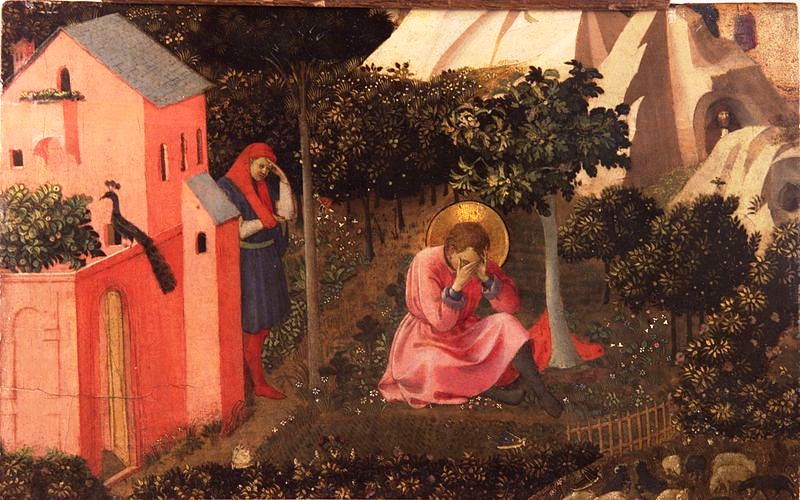
Indeed, fruit has a history, especially the forbidden kinds.
“At least it was a fruit pie,” quipped Anita Bryant after an LGBT+ activist interrupted her televised homophobic screed by throwing a pie into her face on October 14, 1977. Bryant’s allusion to an antigay slur—“fruitcake” was a pejorative term for LGBT+ people—proceeded halfhearted prayers for her pie-thrower on live television. While scenes of a militant homophobe receiving her just deserts often evokes gleeful schadenfreude, neither Bryant’s thinly veiled usage of “fruitcake” nor images of a male assaulting a female with a pie have aged particularly well from the vantage of the early twenty-first century. For those guided by a Catholic moral compass, does taking any momentary pleasure in Anita Bryant’s on-air humiliation indicate we may be intrinsically bad people? While I do not have theological or hamartiological answers to that question, consensus among psychologists shows that human brains are hardwired for such sensations. If Anita Bryant’s rendezvous with a fruit pie elicits conflicting emotions of pleasure and sympathy, then congratulations, for it seems you have found your way to the mythical tree of knowledge and have already tasted its forbidden fruits. The question now is not whether to eat the fruit, but rather how much is good for us? For historians, we are interesting in tasting all the past and present fruits which the seasons bring.

Indeed, fruit has a history, especially the forbidden kinds. Fruit bearing plants first evolved about 120 million years ago, much later than sharks but about 15 million years ahead of the T-Rex. Fruits gave angiosperm plants an evolutionary advantage by rewarding symbiotic species like pollinating insects with sweet nectar and sugary fruits. Fast forward 65 million years, when recognizably modern humans inherited our sweet tooth from our hominid ancestors who gorged themselves on wild fruits. Sweetness was a rare flavor in a world without manufactured sugar, and the ephemeral ecstasies of encounters with ripe or fermented fruit became the stuff of divine revelations for our ancestors. Likewise, we evolved taste buds to detect bitter flavors to avoid poison plants. Children have greater sensitivity to bitter flavors, which is why many youngsters detest raw edible leaves like kale or spinach until they grow older. The human capacity to discern good fruit from bad kept the species alive as it began populating an unknown world 70,000 years ago, where they discovered new faces of god in the good fruits they found.
Nearly every world culture has rich mythologies and ritual calendars centered around fruit, from Haudenosaunee strawberry rites to the fig tree where the Buddha first attained enlightenment. As ancient humans domesticated fruits and constructed more sophisticated societies, stories about fruit helped them make sense of their new world they co-produced with nature. Gather-hunters can satisfy all of the needs of life with less than twenty-hours of labor each week. Ancient agriculturalists with fields, vineyards, and orchards worked much harder for their daily bread in increasingly unequal societies. The ancient Hebrew story of the Garden of Eden and the forbidden fruits of the Tree of Knowledge helped explain the predicament of the human condition wherein more complex forms of civilization do not necessarily lead to greater human happiness or freedom. But even after Eden, ancient Hebrews regarded fruit as signs of divine favor. After all, the Old Testament is a veritable fruit pie with its frequent references to grapevines, figs, apples, dates, melons, pomegranates, olives, almonds, and sycamore fruits. By the era of the New Testament, what was a Galilean wedding without wine?
During the late fourth century CE, St. Augustine’s unfortunate encounter with a pear tree made fruit forbidding in Christian thought. As a teenager, he and a group of friends sneaked into a neighbor’s orchard and destroyed a pear tree just for the thrill. Reflecting on the incident later in life, his desire to steal forbidden fruit convinced him of humanity’s innate capacity for evil. Just as Buddha attained Nirvana while meditating beneath a fig tree a thousand years earlier, Augustine apparently accepted Christianity when a voice called out to him while he wept and prayed beneath a fig tree in Milan. Augustine’s fascinating relationship with fruit provides insight on why he mapped a negative conception of human sexuality onto original sin in his interpretation of the Garden of Eden. Augustine argued for a literal interpretation of Genesis, wherein fruit took on historical rather than symbolic significance. For Augustine, the rebellious human desire for fruit because it was forbidden explained how a good god could create a world where evil existed. Augustine’s ideas remained hotly debated within the early Church, and never took hold in the eastern Orthodox churches. By the sixth century, however, Augustine’s theology of sin and sexuality became ascendant in the Catholic Church.

In the intervening centuries between St. Augustine’s romp in the pear orchard and the fruit pie striking Anita Bryant’s face, modern psychology and the science of sexuality revealed that LGBT+ experiences and identities comprise far more than mere sexual desire. Yet as long as Church leaders continue to pluck fruit from Augustine’s tree on issues of sexuality and LGBT+ rights, they face the evolutionary crisis of seeing younger generations look elsewhere for spiritual nourishment. Likewise, if we felt simultaneous feelings of shame and schadenfreude at the sight of Anita Bryant being assaulted by pie or homophobic clerics with empty parishes, are we really any different than Augustine and his pears? Certainly, the struggle to reconcile our instinctive responses with a higher morality resonates across historical time. Perhaps André Aciman’s meditations on fruit in his acclaimed novel Call be by Your Name sheds more light on human nature than a Roman theologian. But the story of how the concept of forbidden fruit came into Catholic teaching illustrates how understandings about sin and sexuality can and do change over time. This is true of history as well as fruit pies, as the stoic philosopher and Marcus Aurelius observed, “both man and God and the universe produce fruit; at the proper seasons each produces it.”